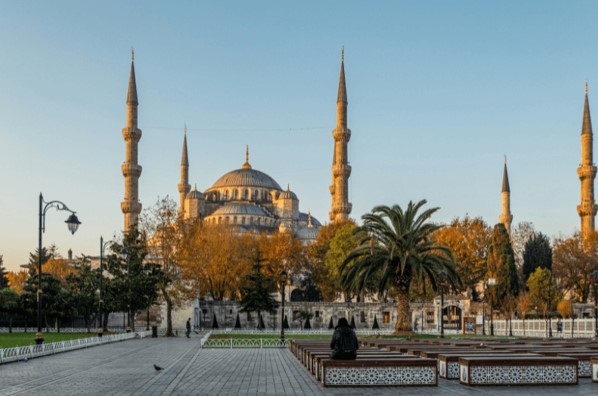Good eating can make a destination more appealing or can be the reason you visit. Here are some great gustatory spots from around the globe.
Singapore
Why: What was once a fishing village has now been transformed into a thriving metropolis in the span of mere decades: Singapore may have been curated to within an inch of its life — trees planted everywhere; no sign of litter; handsome buildings sparkling in the year-round, warm sun — but the omnipresence of its heritage can be felt in quaint shophouses, historic sites and parks that dot the city-state with a land area not much bigger than Chicago. The chatter among its residents, many of whom hail from southern China and different parts of Southeast Asia, are spoken in an (endearingly) accented English. They won’t hesitate to give you directions — even to their own homes. That may be why nearly 20 million tourists (or three times the city’s population) visited in the year before the pandemic. Restrictions have since eased, so if you haven’t yet, go.
Food scene: To call Singapore a melting pot of cuisines from its neighboring countries is an understatement. There really isn’t a singular definition of Singaporean cuisine; more often, you’ll find interpretations of dishes from places like Malaysia, the country closest to Singapore, Indonesia, India and China. The best of these can be found in hawker centers — non air-conditioned food halls brimming with stalls peddling their marquee dishes at affordable prices. You can find such gems as Hainan Chicken Rice (boiled chicken and rice cooked in its glorious fat) and charcoal-roasted, barbecue pork served on springy noodles at Maxwell Food Center, once a wet market in the 1950s; fried oyster omelet, spicy coconut noodle soup (known as laksa) and whole stingray basted with a fermented chile paste at Newton Food Center, another bustling hawker that was featured in the movie “Crazy Rich Asians.” No entree at these places costs more than $5. More recently, cheffy, modern takes on Singapore cuisine are coming of age. One, Candlenut, is a soulful take on Peranakan, or Chinese-Malaysian cuisine, located in a leafy suburb called Dempsey Hill, frequented by expats, tourists and locals alike. Don’t miss the vaunted chile or pepper crab (Long Beach Seafood, or Jumbo Seafood). And if you want to take things up a notch, book a table at Odette, three-Michelin-starred chef Julien Royer’s ode to the French countryside but swaddled in local culture. One dish there is the iconic Hainan Chicken, but cooked in pig’s bladder, á la Française.
Tidbits: Singaporeans are as opinionated about their food as Minnesotans are about the weather. Ask and ye shall receive. Taxi drivers will offer compelling takes on places whispered only among those in the know, and they’ll gladly take you there too. Otherwise, Singapore is a walkable city, and the subway system there is a pleasure to navigate.
— Jon Cheng
New Orleans
Why: Founded by Spain, transferred to France, sold to America, reclaimed after Katrina: New Orleans knows how to flourish amid change. Don’t let its gentle patina of decay fool you. This city keeps adapting — and finding fresh ways to celebrate life. There will always be quirky pop-up parades, spontaneous street dancing to the tunes of corner bands and communal parties like Mardi Gras, whose faded beads adorn wrought-iron balconies year around. But there are also kayak trips on the bayou, an expanded sculpture garden in City Park, the surprisingly expansive National WWII Museum (a local man invented the D-Day boats that won the war). And, of course, there will always be restaurants born of a rich culinary culture that inspire — and help fuel — the city’s nonstop joy.
Food scene: The mashup of cultures — with major contributions by African and Caribbean people — accounts for New Orleans’ singular culinary flair, from gumbo and jambalaya to turtle soup and shrimp rémoulade. The best tastes of these wonders can be found at the storied Galatoire’s Restaurant in the French Quarter, Herbsaint, where streetcars rumble past in the Warehouse District, and Brigtsen’s, in a quaint Victorian cottage in the Riverbend neighborhood. Liuzza’s by the Track in Mid-City skips the upscale tablecloths (and pricing) of those spots, but still delivers the goods. The whole city is happy to see you, but Mosquito Supper Club ticks it up a notch by serving its set menu at a communal table. It feels like you’re dining at a friend’s house. Limited tables make a reservation tough to get without planning. The same is true of celebrated, 12-seat Saint-Germain, in the Bywater, where the inventive cooking rewards those who plan ahead. Find the city’s best shrimp po’boy, a classic sandwich overflowing with breaded and fried beauties, at Parkway Bakery & Tavern. The region’s sizable Vietnamese population is deliciously represented at Lilly’s Cafe, in a humble Garden District storefront that belies the magic of pho within.
Tidbits: In New Orleans, beignets are a must; waiting for a table to eat them is not. In the French Quarter, order your trio of powdered sugar-drenched beignets at Café DuMonde’s to-go window, on the back side, and enjoy them on a bench overlooking the Mississippi. Better yet, head to Café DuMonde’s outpost in City Park. Added bonus: You can walk off the calories at the sculpture garden nearby.
— Kerri Westenberg
Bologna, Italy
Why: Bigger, better-known tourist destinations abound in Italy, but put Bologna on your list for its walkability and blend of history, art, fashion and food. The city is known for its university, thought to be the first in the world and started by students. It’s also known for abolishing slavery in 1256, the first municipality in Italy and maybe the world to do so. Afterward, its population swelled with former slaves and serfs. To create space to rent to these newcomers, homeowners bumped out their upper levels, forming additions supported from below that extended over public sidewalks. These arched porticoes — many beautifully decorated — create rainproof walkways that extend for miles. As you wander them, you’ll discover inviting squares, fascinating museums and exquisite churches, plus plenty of spots to stop for a nibble or sip.
Food scene: Tortellini, mortadella, Parma — these familiar ingredients are everywhere, waiting to be turned into flavorful, hearty meals. Off Piazza Maggiore, you’ll find bustling streets with shops and stands packed with pasta, meat, cheese, fish, fruit and flowers. One store stocks floor-to-ceiling chocolate and also offers back-of-shop balsamic vinegar tastings to show how the flavor radically changes as it ages. Excellent restaurants abound. Don’t be afraid of going where lines form. Since Bologna isn’t a tourist mecca, when a queue forms it means the place is popular with locals. Drogheria della Rosa, in a former drugstore, serves what’s in season. When we complimented the proprietor on a perfect pumpkin ravioli dish, he declared us his favorite table and wouldn’t let our wine glasses run empty. At Da Nello, you’ll find a bustling, well-oiled machine as expert staff seats and feeds hordes, with the tortellini en brodo (broth) as a house specialty. San Silvestro in Cantina presents a sleeker facade with twists on Italian classics. For Italy’s all-important happy hour, sit outside at Caffe Zanarini for an Aperol spritz and be delighted by the tiny sandwiches and dishes of olives served with it gratis. For gelato, Cremeria Cavour serves generous portions, including a memorable vanilla studded with dried fruit and nuts. The best coffee shop, Caffe Terzi, sits on a cobblestone street near the town’s pair of leaning towers. Walk into the narrow space to choose a pastry or dense chocolate cookie and order your espresso. Turn around to a row of tall tables to knock back your coffee quickly, Italian-style. Pay on the way out.
Tidbits: Like Venice, Bologna was built on water. Find 12th century canals in the old city center. It’s quick to tour the Teatro Anatomico, a 16th century wooden lab where some of the world’s first studies of human cadavers happened, advancing medical knowledge. For a soul-stirring art experience, stop at the Church of Santa Maria della Vita to see the Lamentation over the Dead Christ, a grouping of seven terra cotta figures by Niccolo dell’Arca. And don’t miss the eye-popping Fountain of Neptune.
— Sue Campbell
San Francisco Bay Area
Why: Locals are fuming over the way tech companies are driving up home prices and pushing residents further away, but the outpour of money isn’t changing the charm that is the San Francisco Bay Area, where the undulating roads, year-round temperate weather and breathtaking Pacific-ocean views delight. Marin to the north, Sausalito a jaunt through the Golden Gate Bridge, and colorful Oakland and Berkeley to the East. The city’s food scene thrills on high, medium and low — that’s probably why you’re able to have a grand meal any day of the week.
Food scene: Locals won’t admit it, but they still love the great seafood and cioppinos that defined San Franciscan cuisine for decades. The seafood stews at the well-oiled Sotto Mare, for that reason, continue to thrill: deeply-flavored and life affirming. Raw bar enthusiasts have a tossup between Anchor Oyster Bar and Swan Oyster Depot — both excellent, both difficult to get into: Budget an hour to wait at Anchor and don’t ever give up your spot. More recently, new guards of international cuisine have stepped up, gifting the city with fiery, nuanced Thai fare (at Nari) and fastidious yet splendidly greasy Korean barbecue (San Ho Won). Budget permitting, try Dominique Crenn’s lyrical take on Californian-French at Atelier Crenn. And if the spirit moves you, bike across the bay to Berkeley and visit the North Berkeley Organic Farmers market (and adjoining Chez Panisse, the OG institute of farm-to-table), where Frog Hollow Farm’s life-changing peaches and pluots beckon. En route, find a way to stop for sourdough at Tartine and those airy croissants from Ariscault Bakery. Call ahead because they run out — fast.
Tidbits: Traffic can be gnarly, so bike and scooter around if you can. Those walks up the hills can be challenging, though, so plan accordingly. Also, never refer to the city as “San Fran” or “Frisco.” Residents don’t mind tourists, but it doesn’t hurt not to remind them that you are.
— Jon Cheng
New York City
Why: The better question is, why not? The city is a magical place and its diverse attractions make it a new experience with each visit. The Met, Museum of Modern Art and Guggenheim are masterpieces, but so are the Natural History Museum, Harlem’s Museum of Food and Drink and the Tenement Museum. For every Broadway play there’s one off-Broadway waiting to be discovered. Soak in the bright lights of Times Square, but know that independent shops are the lifeblood of the city. Ellis Island, the Statue of Liberty, Wall Street, the National September 11 Memorial Museum — first-timers will be tempted to squeeze in all the highlights no matter how short the visit. But resist the urge: The Big Apple deserves to be savored.
Food scene: It may be cliché to call New York a melting pot, but that’s exactly what it is. You can find $1 pizza and five-star dining — sometimes on the same block. In SoHo (south of Houston — pronounced How-ston — Avenue), pastrami fans shouldn’t be deterred by the line at the famed Katz Deli; it moves fast. Nearby is the equally iconic Russ & Daughters, where you can pick up bites for a Central Park picnic. The historic Essex Market has moved to spacier digs and its crown jewel is the James Beard Award-winning Indian restaurant Dhamaka, which deserves all the spicy accolades bestowed on it. It might be outside your Midwestern comfort zone, but what better place to take chances? Early risers should channel their inner Parisian and have breakfast at Balthazar. Allot time to walk through the markets and shops of Little Italy and Chinatown. If dim sum is on your itinerary, seek out the Nom Wah Tea Parlor — bring a book or lively conversation though, because the wait can be long. Go Michelin star-gazing at Eric Ripert’s Le Bernardin, Daniel (as in Boulud), Marea or Casa Mono. Most offer takeout, too. Drop by hometown favorite Marcus Samuelsson’s Red Rooster in Harlem (or his Streetbird at Yankee Stadium). And some of the city’s best tacos are at the counter-service Los Tacos No. 1. The Chelsea Market outpost is at the end of the elevated High Line trail, making it easy to walk off the guacamole, and its newest location on Lafayette Street in NoHo is conveniently located near a Levain Bakery, making dessert a must.
Tidbits: Make reservations. Whether it’s restaurants, museums or other tourist attractions, plan ahead and check availability. When the city was at a standstill during the pandemic, all subway and bus pay stations were upgraded to allow riders to tap in or use Google or Apple Pay; no more fumbling at ticket machines. If you have a car, use an app like Spot Hero to find a (relatively) affordable place to park and walk. Then use public transportation, city bikes, taxis or ride shares during your stay.
— Nicole Hvidsten




More Stories
Top 5 Cafe around Sudirman Worth a Visit
KC named one of the best places in America to travel
At Urban Hawker in New York, Singapore street food gets a new HQ